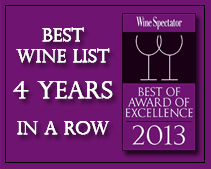Starring Film Role for Bordeaux Château
Clos Fourtet is coming to the big screen near you. Also in this week’s Unfiltered, Danny Glover launches a wine for a cause, the Chinese make illegal tiger bone wine and science opens eyes to the secret behind beer goggles
Theaters are awash in wine documentaries these days, from Jason Wise’s Somm to Warwick Ross’ Red Obsession, but cineastes who’d rather sup of la passion and le frisson in the French filmmaking tradition will soon be sated too, when Gilles Legrand’s St.-Emilion château drama You Will Be My Son (Tu Seras Mon Fils) is released in U.S. theaters in May. (It is currently screening at a number of French film festivals if you can’t wait.)
Legrand’s film tells the story of fictional Right Bank estate Clos de l’Abbé and the battle for its inheritance, pitting the aggrieved son of the domineering patriarch against a hot young winemaker his father dotes on. The movie was filmed at the Clos Fourtet property, a striking backdrop, and the filmmakers clearly did their enology homework. The movie features Fourtet’s real-life pickers, cellar workers and tractor drivers, and the estate’s technical director, Daniel Allard, even gets to deliver a few lines. But you won’t see anyone reaping an actual harvest in You Will Be My Son: Legrand filmed prior so as not to interfere with Fourtet’s vintage. (The bins full of beautiful Merlot clusters were purchased by the film’s producers.)
Unfiltered picked up on a few Easter eggs for serious wine geeks while viewing: a minor plotline focused on whether or not to purchase an optical sorting table (spoiler alert: they end up going with a non-optical Bucher Vaslin); château owner Paul’s characterization of 1963 as an “annus horribilis” not because it was the year of his father’s death, but because it was a mediocre vintage; and a cameo by members of the Ginestet family, which owned Fourtet until 1949. There are even a few hammy wine lines. “My body has been lying fallow,” says young winemaker Philippe, awash in the strobe light of a Bordeaux nightclub, “but I’m tempted to go sowing.” In another scene, Paul offers his biodynamics almanac to his daughter-in-law in order to help her conceive. Unfiltered won’t give away any surprises, but let’s just say that more than a few bungs pop out of their barrels.
• In other film-ish news, actor and human rights activist Danny Glover has made a foray into the wine business. Known for his roles in The Color Purple, Witness and the Lethal Weapon franchise, Glover recently partnered with South African producer KWV as ambassador for the company’s new range of African Passion wines. The line was developed specifically as a fund-raising tool for the TransAfrica Forum, a D.C.-based African human rights and social justice advocacy group, and 10 percent of the proceeds from sales will be donated to the organization. The seven varietal wines, which include a Cabernet, Chenin Blanc and Moscato, are priced at $10 a bottle and made in KWV’s cellar in Paarl using fruit sourced from the Western Cape. Organizers hope that the project, in addition to raising funds in support of human rights and education, will also raise consumer awareness of South African wines in the U.S. market.
Yachts, hotels, restaurants, bidets—what hasn’t the indefatigable Philippe Starck designed? Well, a winery, but that’s about to change. Patrice Pichet, owner of Château Les Carmes Haut-Brion in Pessac-Leognan, Bordeaux, has hired Starck to give the estate a fresh, contemporary look with a new cellar and reception area. “People will notice the cellar. Some will like it, some won’t, but no one will be indifferent,” Carmes Haut-Brion director Guillaume Pouthier told Unfiltered. Starck will design both the interior and exterior, working in must-haves like a gravity-flow system, vats in a variety of sizes and a barrel cellar. One unique element, says Pouthier, will be the integration of a Starck-inspired visitor route that follows an informative path from “grape to tasting room.” Construction begins later this year.
Plus, visitors will be able to live a complete Starck experience by pedaling the three miles from the city center to Carmes Haut-Brion on one of the new urban bike-scooter hybrids Starck designed for the city’s public bike-sharing program. Called Pibal —”baby eel” in French—the sturdy but lightweight bike has a center platform for scooting, fluorescent yellow wheels, and, naturally, a rack for you to carry a magnum bottle. Starck designed the hip bike for free, saying he was honored to help his adopted city of the past 25 years.
• Not that we’re neglecting the arts on the other side of the pond: Armory Arts Week is taking place from March 5-10 in New York City, and Champagne Pommery is on hand to celebrate with artists, galleries, curators, critics and collectors. As the official sponsor of The Armory Show, the city’s largest art fair, the historic Champagne house is pouring its cuvées at a Champagne bar and in the VIP lounge. Housed in Piers 92 and 94 on Manhattan’s West Side, the fair was named for the 1913 New York Armory Show exhibition, which was credited with bringing Modern Art to New York a century ago when it exhibited works by such artists as Pablo Picasso and Marcel Duchamp. Champagne Pommery told Unfiltered the partnership was a natural one, as the estate has held contemporary art exhibitions in its cellars in Reims for 10 years. The series, called Experience Pommery, is intended to pay homage to Madame Pommery, the 19th-century iron lady who frequently commissioned artworks at the estate, including the cellar’s bas-relief sculptures by Gustave Navlet.
• The phenomenon known as “beer goggles”—finding a potential paramour more hale of countenance and melodious of laugh with every shared glass of sweet, sweet alcohol—is really just booze making you more likely to throw out better judgment and say, what the hell, let’s do this, according to groundbreaking new research from Dr. Amanda Ellison at Durham University’s Department of Psychology. Summing up findings that should surprise no one, Ellison told The Telegraph, “Alcohol switches off the rational and decision-making areas of the brain while leaving the areas to do with sexual desire relatively intact.” Ellison also noted that women are not immune to “beer goggles,” or “wine monocles,” as they are known around these parts. Onset can begin with as little as half a glass of wine, so maybe there’s something more to the recent study touting the wine-infused Mediterranean “diet with benefits” than researchers are letting on.
• Traditional Chinese medicine has long been known for its repertoire of unusual ingredients, but its tiger bone wine—made by soaking tiger bones in sorghum or rice wine and traditionally used to treat arthritis and rheumatism—threatens to put China’s wild tiger population out of business. According to a report released on Feb. 26 by the non-profit Environmental Investigation Agency (EIA), titled “Hidden in Plain Sight: China’s Clandestine Tiger Trade,” a scant 3,500 wild tigers remain in China. Despite the fact that China has ratified the UN’s Convention on International Trade in Endangered Species (CITES), and that the manufacture of tiger bone wines has been outlawed since 1993, Chinese officials have apparently been looking the other way as the country continues to grow its domestic trade in tiger skin and bone from wild—and farmed—sources. So-called “tiger farms,” each containing anywhere from 10 to 200 tigers living in squalid conditions, have become a tourist attraction.
While the CITES agreement bans trade in bones and skins from these captive tigers, fearing it would promote poaching in the wild, the EIA says that Chinese officials have been quietly encouraging the trade to continue and has called upon China to man up to its public stance and clamp down. Breeders claim that bones for tiger wine come from tigers that have died of natural causes, but can you really trust someone who runs the tiger equivalent of a puppy mill as far as a tiger could throw him? You certainly won’t be finding any Château Tigre Jaune in Unfiltered’s cellars.
http://www.winespectator.com/webfeature/show/id/48141
You can skip to the end and leave a response. Pinging is currently not allowed.





